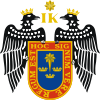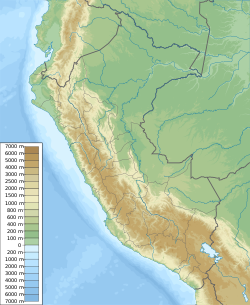Lima
Ciudad de Los Reyes | |
|---|---|
| Nickname(s): Ciudad de los Reyes (City of the Kings) La Tres Veces Coronada Villa (The Three Times Crowned Ville) La Perla del Pacífico (The Pearl of the Pacific) | |
| Motto(s): | |
| Coordinates: 12°03′36″S 77°02′15″W / 12.06000°S 77.03750°W | |
| Country | |
| Province | Lima |
| Established | 18 January 1535 |
| Founded by | Francisco Pizarro |
| Government | |
| • Type | Municipalidad |
| • Body | Municipality of Lima |
| • Mayor | Rafael López Aliaga |
| Area | |
• City | 2,672.3 km2 (1,031.8 sq mi) |
| • Urban | 800 km2 (300 sq mi) |
| • Metro | 2,819.3 km2 (1,088.5 sq mi) |
| Elevation | 0–1,550 m (0–5,090 ft) |
| Population (2023)[3] | |
| • Rank | 2nd in South America 1st in Peru |
| • Urban | 9,751,717 |
| • Urban density | 12,000/km2 (32,000/sq mi) |
| • Metro | 11,283,787[2] |
| • Metro density | 4,002.3/km2 (10,366/sq mi) |
| Demonyms | Limeño/a |
| GDP (PPP, constant 2015 values) | |
| • Year | 2023 |
| • Total | $210.4 billion[4] |
| Time zone | UTC−05:00 (Peru Time) |
| • Summer (DST) | (Not Observed) |
| UBIGEO | 15000 |
| Area code | 1 |
| Website | www |
| Official name | Historic Centre of Lima |
| Type | Cultural |
| Criteria | iv |
| Designated | 1988, 1991 (12th, 15th sessions) |
| Reference no. | 500 |
| Region | Latin America and the Caribbean |
Lima (/ˈliːmə/ LEE-mə; locally [ˈlima]), founded in 1535 as the Ciudad de los Reyes (locally [sjuˈdat de los ˈreʝes], Spanish for "City of Kings"), is the capital and largest city of Peru. It is located in the valleys of the Chillón, Rímac and Lurín Rivers, in the desert zone of the central coastal part of the country, overlooking the Pacific Ocean. The city is considered the political, cultural, financial and commercial center of Peru. Due to its geostrategic importance, the Globalization and World Cities Research Network has categorized it as a "beta" tier city. Jurisdictionally, the metropolis extends mainly within the province of Lima and in a smaller portion, to the west, within the Constitutional Province of Callao, where the seaport and the Jorge Chávez Airport are located. Both provinces have regional autonomy since 2002.
The 2023 census projection indicates that the city of Lima has an estimated population of 10,092,000 inhabitants, making it the most populated city in the country, and the second most populous in the Americas after São Paulo.[5][6] Together with the seaside city of Callao, it forms a contiguous urban area known as the Lima Metropolitan Area, which encompasses a total of 10,151,200 inhabitants.[5][note 1] When considering the constitutional province of Callao, the total agglomeration reaches a population of 11,342,100 inhabitants, one of the thirty most populated urban agglomerations in the world. The city is marked by severe urban segregation between the poor pueblos jóvenes, populated in large part by immigrants from the Andean highlands, and wealthy neighbourhoods. From 1985 onwards, barriers known as "walls of shame" run across much of the city separating rich areas from the poor.[7][8]
Lima was named by natives in the agricultural region known by native Peruvians as Limaq. It became the capital and most important city in the Viceroyalty of Peru. Following the Peruvian War of Independence, it became the capital of the Republic of Peru (República del Perú). Around one-third of the national population now lives in its metropolitan area.
In October 2013, Lima was chosen to host the 2019 Pan American Games; these games were held at venues in and around Lima, and were the largest sporting event ever hosted by the country. It also hosted the Asia-Pacific Economic Cooperation (APEC) Meetings of 2008 and 2016, the Annual Meetings of the International Monetary Fund and the World Bank Group in October 2015, the United Nations Climate Change Conference in December 2014, and the Miss Universe 1982 contest. In November 2024, it hosted the APEC summit for the third time.[9]
- ^ "Peru Altitude". Retrieved 28 July 2014.
- ^ "Lima Population 2023". worldpopulationreview.com. Retrieved 7 April 2023.
- ^ "INEI: Lima cuenta con 9 millones 752 mil habitantes". larepublica.pe (in Spanish). La República. 17 January 2020. Archived from the original on 13 September 2017. Retrieved 1 April 2020.
- ^ "TelluBase—Peru Fact Sheet (Tellusant Public Service Series)" (PDF). Tellusant. Retrieved 11 January 2024.
- ^ a b INEI (Instituto Nacional de Estadística e Informática) 2023, p. 23
- ^ "America: Population Statistics in Maps and Charts for Cities, Agglomerations and Administrative Divisions of all Countries in America". www.citypopulation.de.
- ^ Piro, Isabella (7 September 2023). "Derriban el "muro de la vergüenza" de Lima después de cuatro décadas". Vatican News (in Spanish). Retrieved 14 November 2024.
- ^ "Peru tears down Lima 'wall of shame' but wealth divide stays strong". Reuters. 1 September 2023. Retrieved 15 November 2024.
- ^ "Asia-Pacific Economic Cooperation". United States Department of State. Retrieved 14 November 2024.
Cite error: There are <ref group=note> tags on this page, but the references will not show without a {{reflist|group=note}} template (see the help page).









